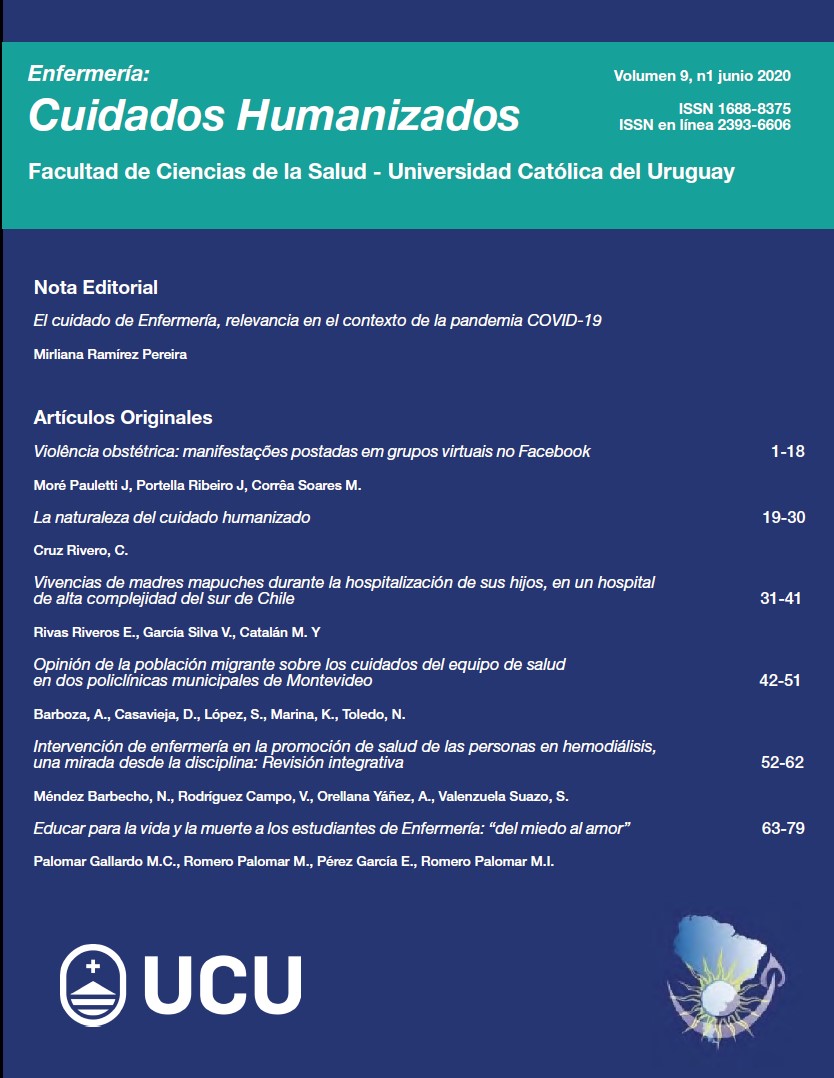Educate Nursing students for life and death: “from fear to love”
DOI:
https://doi.org/10.22235/ech.v9i1.2167Keywords:
education, death, grief, Nursing, Gestalt TherapyAbstract
This research arises from the phenomenological observation as a care nurse caring for patients at the end of life and as a nursing teacher in the subject "Coping with death: interdisciplinary intervention". There are great deficiencies in training in care at the end of life, death and grief. To cover this need for training of the students, I make a proposal for teaching intervention in the subject "Coping with death: interdisciplinary intervention", the objective of which is to evaluate the impact that the educational proposal of the subject has on nursing students. Methodology: This research is framed in the interpretive or hermeneutical paradigm, with a qualitative approach. From a phenomenological point of view, a descriptive study is proposed and as a research instrument the reflective diaries of the students will be taken, enrolled in the subject that they chose the class attendance option. Results: The number of newspapers was 36, but 14 were selected randomly. The qualitative analysis has allowed structuring the student's discourse in 5 analysis categories: Reason for choosing the subject; Personal growth; Achievements in the learning process; Professional application of the techniques developed in the subject; Assessment of the subject by the student. Conclusions: The educational intervention of the subject has had a high impact on the students, in two important dimensions for their lives. On the one hand, increasing their academic skills as future professionals, and on the other, acquiring positive skills and attitudes about death, to live and love life.
Downloads
References
2. Chan M. Cuidados Paliativos. Ginebra: Organización Mundial de la Salud. [Internet].2014[citado 8 Mar de 2015]. Disponible en: http://www.who.int/cancer/palliative/es/
3. Instituto Nacional del Cáncer (NCI). Cuidados Paliativos durante el Cáncer. [Internet].2010 [citado Oct 2017]. Disponible en: www.cancer.gov/espanol/cancer/cancer-avanzado/opciones-de-cuidado/hoja-informativa-cuidados-paliativosinformativas/apoyorecursos/ cuidados-paliativos
4. De Oliveira Cruz RA, Cartaxo Gomes de Arruda AJ, Glenda Agra G, Lopes Costa MM, De Medeiros Nóbrega VK. Reflexiones sobre los cuidados paliativos en el contexto de la formación en enfermería. J Nurs UFPE. 2016; 10(8):1-7.
5. Palomar Gallardo MC. Proyecto socio-sanitario formativo para familiares de personas en situación de enfermedad avanzada o terminal. En: XX Congreso Juventud, Familia y Sociedad. Construyendo una Ciudadanía Solidara: 23,24 y 25 de noviembre de 2005, Huelva: Organizado por el Centro de Inserción Sociolaboral Valdoco.
6. Palomar Gallardo MC, Arana Álvarez R, González Rodríguez A, Merino Navarro D, García Padilla.FM. Los Cuidados Paliativos en el Domicilio, una Experiencia de Formación Pregrado Enmarcada en el proyecto socio-sanitario del distrito V de Huelva. En: VII congreso de la Asociación Andaluza de Enfermería Comunitaria (ASANEC): 14 y 15 de junio 2007, Úbeda Jaén. Reconocido de interés Científico Sanitario por la Consejería de la Junta de Andalucía.
7. Palomar Gallardo MC, Merino Navarro D, González Rodríguez A y Arana R. Taller de Bioenergetica: La promoción del bienestar de personas enfermas y familiares en el contexto de un proyecto de intervención comunitaria. En: VII congreso de la Asociación Andaluza de Enfermería Comunitaria (ASANEC):12 y 13 de junio 2008, Cádiz. Reconocido de interés Científico Sanitario por la Consejería de la Junta de Andalucía.
8. Olvera, A. Pedagogía Sistémica. Pedagogía del Siglo XXI. El éxito es tu historia. México: Grupo CUDEC; 2009.
9. Olvera, A. Traveset, M. Parellada C. Raíces, vínculos y alas. Una Pedagogía de la abundancia. México: Grupo CUDEC; 2012.
10. Hellinger B. Los órdenes de la ayuda. Buenos Aires: Alma Lepik; 2006.
11. Hellinger B. Órdenes del amor. Barcelona: Herder; 2008.
12. Garriga J. Vivir en el alma. España: Rigden Institut Gestalt; 2008.
13. Ortega Galán AM. El proceso de la muerte en el ámbito formal de los cuidados: un estudio cualitativo desde la perspectiva profesional sanitaria de Huelva. Tesis doctoral. Universidad de Huelva [Internet] 2012. [citado. 1 Mar 2015]. Disponible en: http://rabida.uhu.es/dspace/handle/10272/6044
14. Palomar MC, Ortega A, Ibáñez O. Últimos días. El proceso de Morir. Disponible en: Pérez E, y Medina FJ. Aspectos Psicosociales en Cuidados Paliativos. Madrid: Ed Enfoediciones; 2010.p.205-249.
15. Sanz Ortiz J, López Imedio E. Enfermería en cuidados paliativos. Madrid: Panamericana; 1998.
16. Portero de la Cruz S, Cebrino Cruz J. Afrontamiento de los estudiantes de Enfermería ante la muerte. Metas Enferm 2017; 20(4): 4-8.
17. Prado RT, Leite JL, Silva IR, Silva LJ, Castro EAB. The process of dying/death: intervening conditions to the nursing care management. Rev Bras Enferm [Internet]. 2018;71(4):2005-13. http://dx.doi.org/10.1590/0034-7167-2017-0173
18. Pérez ME, Cibanal LJ. Impacto psicosocial en enfermeras que brindan cuidados en fase terminal. Rev Cuid. 2016; 7(1): 1210-8.http://dx.doi.org/10.15649/cuidarte.v7i1.295
19. Stochero HM, Nietsche EA, Salbego C, Pivetta A, Schwertner MVE, Fettermann FA & Rodrigues de Lima MG. Sentimentos e dificuldades no enfrentamento do processo de morrer e morte por graduandos de enfermagem. Aquichan. 2016; 16(2): 219-229.
20. Silva Oliveira E, Agra G, Formiga Morais M, Pereira Feitosa I, André Gouveia BL, Lopes Costa MM. El proceso de muerte y morir en la percepción de académicos de enfermería. Rv J Nurs UFPE. 2016;10 (5):1709-16.
21. Alonso, J P, La construcción del morir como un proceso: la gestión del personal de salud en el final de la vida. Universitas Humanística [Internet] 2012. [Fecha de consulta: 28 de noviembre de 2018] Disponible en:<http://www.redalyc.org/articulo.oa?id=79125420006>ISSB 0120-4807
22. Lima R, Bergold LB, Souza JDF, Barbosa GS, Ferreira MA. Death education: sensibility for caregiving. Rev Bras Enferm. 2018;71(4):1779-84.
23. Kubler R. Sobre la muerte y los moribundos. México: Grijalbo; 1996.
24. De Hennezel M. La muerte íntima. Barcelona: Plaza y Janés; 1996.
25. Álvarez Gayou JL. Cómo hacer investigación cualitativa. México: Paidós Educador; 2003.
26. Meleis AL. Theoretical nursing: development and progress. 3ª ed. Philadelfia: J.B. Lippincott; 1997.
27. Marriner-Tomey A. Modelos y teorías de enfermería. Madrid: Mosby/Doyma; 1994.
28. Hernández Conesa JM, Moral de Calatrava P, Esteban-Albert M. Fundamentos de la Enfermería, Teorías y Modelos. 2ª ed. Madrid. McGraw-Hill: Interamericana; 2003.
29. Guillaumet M, Amorós G, Ramos A, Campillo B, Martínez Momblan MA. La narrativa como estrategia didáctica para una aproximación al proceso de la muerte. Rv enferm global [Internet]. 2018; [marz 2019)]; 14(49):197-12. http://dx.doi.org/10.6018/eglobal.17.1.260491
30. San Rafael Gutiérrez S, Siles González J Solano Ruiz C. El diario del estudiante de enfermería en la práctica clínica frente a los diarios realizados en otras disciplinas. Una revisión integradora. Aquichan [Internet] 2014. [20 Nov 2018]; 14(3):403-416 Disponible en: http://aquichan.unisabana.edu.co/index.php/aquichan/article/view/2218/pdf
31. Medina JL. La pedagogía del cuidado: saberes y prácticas en la formación Universitaria en Enfermería. Barcelona: Laertes; 1999.
Downloads
Published
How to Cite
Issue
Section
License
Copyright (c) 2020 Enfermería: Cuidados Humanizados

This work is licensed under a Creative Commons Attribution 4.0 International License.

















